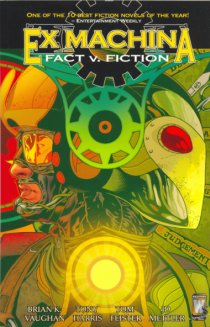 Odds
Odds
are that most CHUD.com readers know who Spider-Man and Batman are.
Brian K Vaughan has written those characters, but the comics he’s best
known for may be under the radar of those of you who aren’t hardcore
comic book readers. But the books that he writes are actually the kinds
of comics that appeal to non-comic readers in the same way that Neil
Gaiman’s Sandman found an audience far outside the kind of people who could name every roster of the Justice League.
Y: The Last Man,
a creator owned comic that Vaughan co-created with artist Pia Guerra,
is about a mysterious plague that kills every man on Earth – except
shiftless young escape artist Yorick and his monkey companion
Ampersand. Runaways
is a book set in the Marvel Universe, about a group of kids who
discover that their parents are actually a cabal of supervillains.
Vaughan’s other monthly comic (also creator owned) is Ex Machina,
about a man named Mitchell Hundred who gains the power to talk to
machines and becomes a superhero. After he stops one of the planes from
hitting the Twin Towers on 9/11 he retires and runs for mayor of New
York City.
The third trade paperback volume of Ex Machina, Fact v Fiction, is in stores now (Click here to buy it from CHUD). Y has a number of trade collections to date (click here to see them and buy them from CHUD), and Runaways is available both as manga-sized digests and a hardcover collection available (you guessed it – click here for those).
Vaughan’s won himself some Eisners already – that’s the comic industry
version of the Oscars – and this year it looks like he could add some
more to the collection.
I used the release of the latest Ex Machina
trade as an excuse to get Vaughan on the phone and pick his brain. The
guy’s writing three regular comics a month and a couple more on the
side, but he still was able to take about an hour out of his day to
talk about his comics, his career and more in this rambling interview.
Q: Ex Machina volume
3 just came out in trade last week, and we’re in the middle of the
Moussaoui trial in the real world. The tie-in here is 9/11 – have you
given any thought to what happened to the terrorists on the other plane
that Mitchell Hundred was able to stop?
Vaughan:
You know, it’s interesting. I suppose I have, but I guess it’s
something I haven’t felt like addressing so far. Sort of like I would
want to address the fact that in this fictional universe there are
people who survived in that other tower because obviously in our world
those people are gone. It was never my intention to cause pain to
people, or it doesn’t exist just to be speculative: ‘What would have
happened if these guys had been alive?’, it’s more about trying to find
a new way to look at our world by looking at this funhouse mirror. I
try not to get into specifics so much of that day.
Q:
In the latest story arc you have the gas attack on the anti-war rally –
it’s been the biggest departure from the real world in your universe
since 9/11. What made you decide to go there?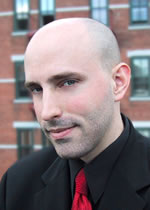 Vaughan: With Ex Machina
Vaughan: With Ex Machina
it never starts with ‘Here’s a political ideal I want to shove down
people’s throats’ or ‘Here’s something I want to explore,’ it’s just
what is a good story and what is dramatic and what has a human angle
that will have an effect on my protagonist. Ex Machina takes place a
few years in the past and those anti-war demonstrations in New York
were so huge it was impossible to ignore, and because Mitchell made
different decisions than Bloomberg did – Bloomberg didn’t allow a march
and Mitchell did – so I was trying to show something different. But
again, not to make a political statement, just because it’s a good
story.
Q: How much of a
political statement is the book? You seem pretty even-handed, where you
have pages and pages of characters arguing over policy and politics,
but where does your opinion come in?
Vaughan: Almost
nowhere, I suppose. Some arcs Mitchell, the mayor, might have politics
that resemble my own. Sometimes it may be Candy, who’s more
conservative, sometimes it may be Deputy Mayor Wylie. I’m not trying to
say a political statement, I’m more talking about politicians. Ex Machina
has always been about heroism and what does it mean to be a hero. After
9/11 it seemed people were desperate for leaders who were also heroes,
whether it be Kerry running on his war record or – I live in
California, and even a fictional action hero like Schwarzennegger ran.
People have a bizarre desire to be led by a hero, and what does that
mean? Is that even something that’s real?
Ex Machina has always been more about heroism and politicians than it has been about a specific political ideology.
Q: Do you think you could write Ex Machina or a book like Ex Machina without the superhero angle? Could you write a straight up City Hall comic?
Vaughan:
I guess that I could, but I didn’t start with this idea thinking people
would only pick up the comic book if it had a superhero in it. I’m not
a superhero snob; I like superheroes. My favorite superhero stories
were always books like Watchmen, where superheroes were used as an analogy for something else. I think that since Ex Machina
is a book about ‘Are heroes real or not?’, could there be a more
perfect way of talking about that without superheroes? I could write a
political book without superheroes, but I couldn’t write this story
without them.
Q: Would people read a book like that? I know that you’ve said in the past that one of 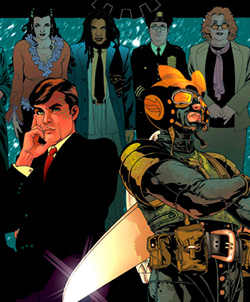 your favorite books that people don’t read is Queen & Country – a great title that maybe people don’t pick up because it doesn’t have superheroes.
your favorite books that people don’t read is Queen & Country – a great title that maybe people don’t pick up because it doesn’t have superheroes.
Vaughan: I don’t know. The Queen & Country novels sell really well, and I’m sure the Queen & Country
graphic novels do well. In the grand scheme of things… the other day I
heard that Michael Eisner has a crappy new talk show on one of the
networks that got a 0 share. It’s one of the lowest rated TV shows in
the history of mankind. I was curious what a 0 share was, and they were
like, ‘It’s only 700,000 people.’ 700,000 is more than triple some of
the best-selling comics.
I
think that comics are such a specific, tiny audience of people, what do
you care if it’s going to be the best-selling comic or the 300th
best-selling comic? It’s all small numbers. Do whatever you like. I
think books like Queen & Country and Optic Nerve and Chris Ware’s Acme Novelty Library stuff,
they all find a pretty big audience. So yeah, I think the audience is
there for non-superhero books. It may not be as large, but the
difference is so infintisimal, what does it matter?
Q: Speaking of audiences, has there been an uptick in the audience for Runaways in the second season?
Vaughan: I think that monthly we definitely sell better than before our previous season ended. But bringing back Runaways
was always more about how the digest sized collections do in
bookstores, which just blows the monthly numbers out of the water. I
thin it does fine, it sells about the same numbers Y and Ex Machina do, about 30,000 every month. All of my books do much better in collections than they do in monthly comics.
Q: Why do you think that is?
Vaughan:
I don’t know. My books exist in this weird limbo where they’re a little
too mainstream for the Comics Journal and they’re a little too off the
beaten path for Wizard, even though both those publications have been
really nice to me. But I think that limbo, while small in the direct
market, that’s basically the rest of the world – a little too
mainstream for the Comics Journal and a little less superhero-y than
Wizard. I think bookstores there are people who have read reviews in
Entertainment Weekly or whatever; they’re not the kind of monthly
buyers who buy comics in specialty stores. I’m not sure why it is, and
at this point I’m just rambling, but either way I’m grateful for it. I
don’t care if you pick it up in trades or single issues – either way
it’s spectacular for me.
Q:
I’m usually a trade waiter, but with your books I tend to make the
effort to get your books monthly. That’s because you have these great
cliffhangers that make coming back month after month fun, while I feel
that a lot of other comics, with the decompressed storytelling or
whatever, seem to end their issues whenever they’ve run out of pages.
Does your film school background help you with that, with a focus on
structure?
Vaughan: I
suppose it doesn’t hurt. It’s just basic storytelling instincts. I
never think of an arc, if it’s four issues or two issues or six issues,
I don’t tend to think so much about the beginning, middle and end of
each, but each 22 page story I really think of that as its own
universe. I read most of my comics monthly and I have a short attention
span, so I like those short little bursts. I think really long and hard
about making each issue satisfying.
And
cliffhangers? I don’t know. I guess I’m grateful that that’s what I’m
known for, but I don’t work hard at it – it seems to come naturally.
You take the most dramatic thing in the hopes that it will bring people
back the next month.
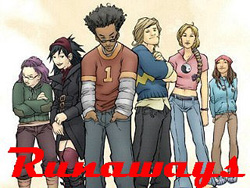 Q: Runaways is
Q: Runaways is
crossing over with Civil War [a big Marvel crossover event where the
government wants superheroes to reveal their identities and get
registered. Some heroes are for it, some are against it – and they duke
it out]?
Vaughan: Runaways/Young Avengers is going to be a tie-in. But Runaways
itself, because so many of our readers only read Runaways in the digest
collections and that might be the only non-manga book that they read,
I’m trying to keep Runaways
fairly self-contained. We’re not going to disavow Civil War in our
book, but we’re not going to go out of our way to acknowledge it so as
to not confuse new readers.
Q: So this is going to be a one shot?
Vaughan: Runaways/New Avengers is going to be a four issue mini-series and Zeb Wells, one of my favorite new writers, is writing it.
Q: How closely are you working with him?
Vaughan:
Really closely. He and I have talked on the phone a bunch, and he went
out to lunch with Allen Heinberg the other day, so we’re working really
closely. At the same time when I was breaking in I did a lot of these
crossovers and I resented other writers riding me too hard. My belief
is to pick someone you trust, whose work you like, and let them go to
town. I’m there to help if he ever has specific questions about stuff,
but for the most part it’s Zeb’s story and it’s really, really good.
Q: Which side are the Runaways taking?
Vaughan: I’m not going to tell you! Are you crazy? That’s the point of the whole book. You’ll have to wait and find out.
Q: Which side would you take?
Vaughan: I
don’t know. I just saw someone talking about how they’re a die-hard
liberal so they’d be anti-registration, but it seems like more of an
analogy to gun ownership to me. You’re allowed to have something
powerful, but I think liberals are more about it has to be registered
and you have to have a license –
Q: And have regulations, and a bureaucracy.
Vaughan:
Exactly. It’s hard because, yes, in the real world it would be crazy
having all of these characters running around being vigilantes, but the
Marvel Universe is not the real world. It’s too hard to apply real
world logic to it. But it’s what makes the best story that matters.
Thankfully Mark Millar’s story is pretty incredible, and I think it’s
going to be great.
One
of the nice things about being a freelancer is that I’m one of the few
guys who gets to be privy to both One Year Later stuff over at DC and
Civil War stuff over at Marvel and although I’m not directly involved
with either, they’re both really good. Events are usually atrocious and
my least favorite thing in the world, but both companies are bringing
their A game to this.
Q:
You also are an Ultimate writer. One complaint I keep hearing about the
Ultimate line lately is that the writers have stopped Ultimizing
characters – they’re just introducing characters without the old
continuity. What’s your take on that?
Vaughan: My time with Ultimate X-Men is
done; [Robert] Kirkman’s taking over for me, but I heard that a lot.
The mission statement of the Ultimate books originally was that these
were books that were going to appeal to new readers. If you can’t wade
through 40 years of X-Men continuity or the Clone Saga stuff in
Spider-Man, this is just getting back to the basics. For me that’s
always been the most important part of the Ultimate books – telling
very accessible stories that highlight the classic features of these
characters. But I think that the most vocal fans are the readers who
have already been picking up a book like X-Men for the last twenty
years and if they’re going to pick up another book they want it to be
different. I don’t think that’s the point of the Ultimate books, to be
different for different’s sake.
That said I think something like in Ultimate Spider-Man
having Kitty Pryde be Peter Parker’s new girlfriend is spectacular. I
think that’s breathed new life into a great book – but it’s not because
it’s different or something we haven’t seen before. It seems like
something that Stan Lee would have done when he was writing it. It
feels consistent with that world. I don’t think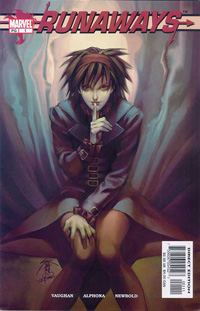
the Ultimate books have ever been as good as they are right now, but I
understand that there’s this demand from the hardcores to show us
something new.
Q: It
seems like the Ultimate books are something you have to have eventually
in a comic book universe because of the nature of serialized
storytelling – these characters can never change too much while also
accumulating a ton of baggage over time. On the other hand your creator
owned books are finite, so you have end points. Y: The Last Man is ending this year?
Vaughan: I guess it’s a year and a half away technically, but yes, issue 60 is going to be the final issue of Y.
Q: Do you think that’s the better way to do comic book storytelling? Or do you think that – well, if Runaways is still running 45 years from now with the same characters and maybe even at the same age, could it still be a good book?
Vaughan: I think that’s great. Y and Ex Machina
both have real, definite endings and I want them to end at a specific
time, but no, Runaways can keep going forever. The analogy that a lot
of writers use is The Simpsons,
where you don’t have the characters get older, you just keep telling
new stories in this particular paradigm. Some years you have lousy
seasons of The Simpsons and
some years they come back, but there are some stories that you can tell
forever. Spider-Man probably shouldn’t have an ending. I think if you
get to the point as a reader where you feel like you’ve seen every
possible Spider-Man story, that’s OK. There are a million other comic
books out there.
So some books, yes it’s good for Y
to have a definite ending. But some books – whether you decide to age
the Runaways or bring new Runaways in every season, or have them be
stagnant age-wise forever, I don’t care. That’s a book that was my gift
to the Marvel Universe. I hope it keeps going after I leave the book.
Q: When Y ends is that going to be it for the characters? You’ll never go back to that universe? What’s interesting about Y
is that because Yorick ages in real time there are all these gaps in
the story, months where we don’t see what’s going on. Would you go back
and do an Untold Tales of Y: The Last Man?
Vaughan:
I don’t think so. I like that we occasionally hint at things that have
happened in between the panels in the story, and I like that those are
allowed to exist in reader’s heads. If you want to go off and write
crazy fan fiction about it, that’s fine, but I would rather leave it up
to audiences. I’ve always known it’s going to be 60 issues – no
specials, no annuals, we’re not going to milk the franchise. That’s it.
It’s a novel with a beginning, middle and end, and once it’s done, it’s
over. Until I’m 45 and washed out and can’t find any other work, then
I’ll be coming back to milk the cow again with Dr. Mann one shots or
whatever.
Q: Y has been in development hell for some time. What’s the status of the film? Do you know at all; are you in the loop on that?
Vaughan: Yeah,
I’m really in the loop. In fact I would upgrade it from development
hell to development limbo, maybe. I am actually writing the screenplay
right now for Y: The Last Man; they’re letting me take a shot at it. It’s been really good. The input I’ve gotten so far has been really positive.
In
no way does that mean a movie is right around the corner, or that a
movie ever will get made period, but it seems to be on an OK track.
It’s nice how much they’ve let me be involved.
Q: Y
on one hand is finite, but on the other hand is sprawling. I would
assume that the studio would want a solid end for the film, but they
might also want a franchise. Where would the film go – where would it
end?
Vaughan: Everyone
asks me this, and I appreciate the curiosity but at this stage, because
the movie’s such a tenuous thing that could collapse at any moment, I
guess I’m just not going to comment on it. But yes, not a day goes by
where someone doesn’t ask me, ‘Why isn’t Y
an HBO series? It would be a much better TV show. Why is it a movie?
How can it be a movie? What if it comes out first, is it going to ruin
the end of the comic book, do you have a different end for the movie?’
I’ve considered all of these things and I wouldn’t do the movie if 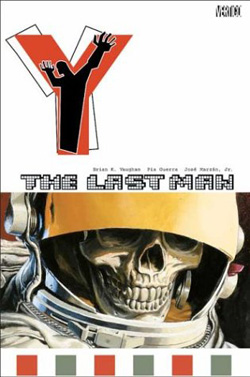 I
I
didn’t think it was a good idea and would honor everything that would
make the comic book great. I can’t describe what I’m doing but I’ve
thought about everyone’s concerns and all I can say at this point is
trust me.
Q: We will. You also wrote, or are writing, a draft of the Ex Machina movie. Is that still you or has it moved on to someone else?
Vaughan: It’s still me, but Y has a little more heat to it because it’s been in development for a while, so right now I’m in Y mode. But right after Y I’m going to jump into Ex Machina.
And again, it’s not a sure shot. I think they have other guys – it’s a
weird situation. Someone else is writing a screenplay and I’m writing a
screenplay and it’s weird to be competing with someone else for
something I created, but I totally understand. I’m new to the world of
movies and it means a lot that they’re letting me have a shot at all.
But based on how well-received my Y stuff has been so far, I guess I’m hopeful that Ex Machina could go equally well. But that’s further down the line. Right now I’m in Y movie mode.
Q: When you sign over the rights to these things how much control do you retain?
Vaughan:
I never like to get too specific into contracts or anything, but I will
say that Vertigo and WildStorm are both really generous with the amount
of control that not just I have, but Y is co-owned 50/50 with Pia Guerra and Ex Machina
50/50 with Tony Harris, so we have a lot of decisions to make between
us and with the studio and with DC Comics, so it’s complicated. But at
the end of the day they’re creator owned books and so the ownership
falls to us. We don’t always get exactly everything we want, but our
experience has been really good with New Line so far. I’m not yet jaded
Alan Moore, but that could be right around the corner. Hearing
everything he’s gone through I can’t blame him for feeling like that.
I’m new enough that it’s still fun.
Q: If tomorrow an executive at New Line decided that Y should be a wacky sex comedy –
Vaughan: Absolutely. They could do that.
Q: There’s no way you could put your foot down?
Vaughan: I
could be a crybaby about it, but no. I know what I did. I signed over
the rights to the movie. I don’t have a problem doing that because I’ll
always be a comic writer who dabbles in screenplays, not a screenwriter
who dabbles in comics. For me the comic book has always been not just a
first love, it’s my only passion. The fact is that month in and month
out I get to do the comic books the way I want to, and I know that Pia
and are going to get to end it exactly the way we want to. I’m sort of
zen about the movie experience. That’s easy to say now, when it’s
hypothetical, and if it does turn out to be a wacky Cinemax wankfest
that they put out then I’m sure it’ll make me sad. But right now I
understand that even if I’m involved it’s ultimately out of my hands.
I’m OK with that. As long as they don’t touch my comic.
Q: Is David Goyer still attached to Y?
Vaughan: Very much so [as a producer]. He and I talk about it often. It’s great to have his input.
Q: So you’re a comic guy first and foremost – forever?
Vaughan: It
would be nice for there to always be a balance. I was an NYU film
school nerd so I always thought movies would be what I did with my
life. But I fell in love with comics and got my earliest work when I
was still in college, with Marvel. I love comics, but no, I don’t see
why I can’t do both. I’m fairly productive on the comic side, and I’ve
been writing screenplays – I love to write. I can’t imagine doing only
one, being a screenwriter or comics writer. I hope there’s always a
balance.
Q: How are you so productive? How many books are you doing a month currently?
Vaughan: It sort of fluctuates, but it’s around four and a half. The monthly books are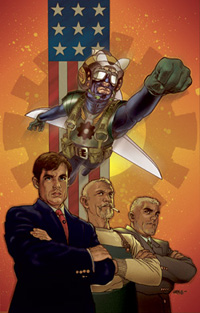 Runaways, Y and Ex Machina right now. Then I have a bonus slot; like I’m doing the ongoing Escapist
Runaways, Y and Ex Machina right now. Then I have a bonus slot; like I’m doing the ongoing Escapist
comic book that’s going to be coming out from Dark Horse and I’m doing
a Dr. Strange thing with Marvel, just a miniseries. So things pop up
now an again.
Q: How do you maintain that productivity? What’s your secret?
Vaughan: I
guess the secret is that it’s not very hard. It’s not working in the
coal mines; I’ve had other jobs that are horrendous. Jobs are hard.
Even if you’re going into an office and answering phones, jobs are
unpleasant. But I work at home. I roll out of bed in my boxers – sorry
to put that image in your head – and I sit down and write about people
punching each other and kissing each other. It is a joy.
When
you have to write 22 pages a week it’s not a lot. I’m lucky enough to
have ideas; I’ve never had writer’s block before. I’ve always had
something I’ve wanted to say.
Q: Do you believe in writer’s block? I know some writers who have never been blocked who just don’t believe it’s a real thing.
Vaughan: It
sounds sort of… I imagine that if I had had writer’s block before I
would feel that any writer who says that it’s a fiction is a douche.
I’m reluctant to be like, ‘No, it doesn’t exist.’ But I’m lucky enough
that I never had it before. The closest thing I’ve had to approximating
writer’s block is X-Box, in that is fun and it is sitting there and it
is easy to do and writing is hard and complicated and lonely. I think
writer’s block is a way of being, ‘Why isn’t writing fun right now?’
But I’ve been doing it long enough that I don’t think writing is ever
fun, it’s a drag. It’s not hard, but it’s not fun either. Finishing
something and being done with is fun, and it’s thrilling, and it’s
worth fighting for.
Q:
When you’re working on what’s essentially a novel that’s going to take
you five or six years to finish, the person that you are at the end of
it is probably such a different person than who you were at the
beginning. Do you find that your goals for the work change, and do your
personal feelings about the characters evolve over the years?
Vaughan: That’s a good question. One thing with Y
is, yeah, it’s hard, because I’m being very faithful to the pitch, the
proposal, the road map I created more than four years ago. And you’re
right in that I’m a very different writer now. Even looking back at
early issues of I sort of cringe, but I think I’ve become a better
writer. Y has always been about the last boy on Earth becoming the last
man on Earth and it’s a story about an obnoxious, self-righteous,
crummy kid. Yorick is 22 when it begins and I guess I was probably 26
or something when I started YY
and looking back at how much I despised myself when I was 22. So now
that I’m almost 30 I look back at the 26 year old and hate him as well,
but I know there’s a big journey from 22 to 26, how much I changed. I’m
trying to stay faithful to that.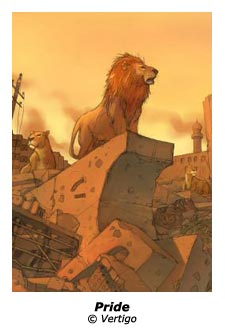 But yes, it is hard to stay on track, but I think Y
But yes, it is hard to stay on track, but I think Y
has been a good story from the beginning thanks to Pia’s involvement. I
think it hasn’t been too hard to remain faithful to what we set out to
do.
Q: Your new original graphic novel Pride of Baghdad is coming out at the end of the summer?
Vaughan: September, finally.
Q: And that’s been an art issue?
Vaughan: No,
and that’s always hard because Niko Henrichon did an unbelievable job,
and he’s been done forever. It’s been sitting on my desk, fully
colored, painted, lettered, everything, for a couple of months now. I
know it’s impossible for folks to believe because in comics stuff is
usually solicited before it’s started, so it’s hard to fathom that
something’s done and it’s just sitting there. I have to put my faith in
DC Comics – they’re really excited about it and they think it’s going
to be the big book of the year and they want it to do as well in
bookstores as it does with comics retailers. That means putting it in
stores when people are there to buy it, and September is for bookstores
bizarrely the start of the holiday season.
[At this point Vaughan gets a knock at the door – it’s a delivery of Ex Machina Special #1. We’ll get back to that in a minute]
Q: So this is a real departure with it being an animal book.
Vaughan: I pitched it three years ago before WE3
came out and I thought I was going to be this terrifically novel
bastard by bringing back talking animals to comics. And then Grant came
out with this extraordinary book, but thankfully Pride of Baghdad and WE3 are about as different as they can be, so hopefully there’s room for both of us.
When
you put out four books a month, you start to hear the same things about
your work: oh, the cliffhangers, oh, the retarded pop culture
references… you start to want to stretch yourself and do something that
doesn’t have any of those things. It’s a self-contained 128 page story,
so no cliffhangers. It’s one story with a beginning, middle and end. No
pop culture references, because they’re Iraqi animals and they don’t
watch Seinfeld. It’s a really different kind of book.
Q:
You’re telling a story about animals set free from their cages in the
current Iraq War – the political allegory seems to be potentially huge.
You said you keep your personal politics out of Ex Machina… how about Pride?
Vaughan: I would say less so, but it’s not as much of a screed as people might think. There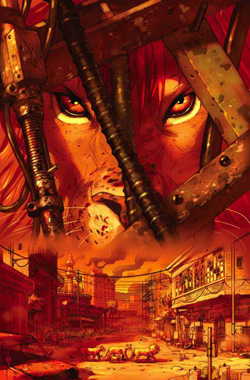
are four lions in the zoo, and they each represent a different
perspective of what it must be like for Iraqi citizens. There’s one
lion who remembers the wild, before the zoo, with the zoo representing
Saddam’s regime. There are cubs where this is the only way of life
they’ve known. There are some who want in, some who want out. Hopefully
it’s a balanced perspective of the war. But at the same time it’s not Animal Farm
because I’m telling a true story in a way – obviously it’s greatly
embellished and the animals didn’t talk. It’s inspired by a true story
of four lions who escaped the Baghdad zoo, so the beginning, the middle
and their ultimate fate are pre-determined. I tried to tell that story
as honestly as possible and whatever conclusions people want to draw
from that they’re welcome to.
Q: So you just got your hands on the Ex Machina Special. Why is there a Special?
Vaughan: Because
it would be nice for more people to read the book. It’s doing really
well, but I think that a lot of people hear good things about it, hear
that it gets nominated for awards, but it’s always hard to know whether
to jump in with issue 19. So it was partly borne out of giving everyone
a really accessible jumping on point, and it’s not just an old bad Family Ties
flashback episode, we’re not just rehashing stuff we’ve done. So if
you’re a longtime reader you’re getting something new as well.
It
starts in the present, so we get to see some Mayor Hundred stuff,
briefly, but it’s largely a tale from his superhero past as this hero
called The Great Machine. It’s cool. We sorted of hinted over the last
two years that Mitchell had this bizarre archnemesis called Pherson,
and we’ll finally for the first time be showing you who that person was.
That’s
all the party line for saying why there’s a Special, but true secret
real reason is that I wanted to work with Chris Sprouse on something.
He is everything Chris Sprouse is cracked up to be, so if you’re a Tom Strong fan or an Ocean fan, you’ll love it. He’s stayed really true to the spirit of Tony’s art, but it’s very distinctly Chris’ own stuff.
Q:
There was an interesting thread on your message board today that
speculated that Mitchell could have – knowingly or not – affected the
outcome of his election with his powers. Can you comment on that?
Vaughan: People
have brought that up often. We’ll just have to wait and see, but I’m
sure that if the dunderheads on my message board could come up with it
then I’m sure some reporter from the New York Post has probably had the
same idea, and will be troubling Mitchell with that down the line.
Q: Is he hiding aspects of his powers? The latest issue indicated that he might be.
Vaughan: Yeah,
and the next issue will further that. We don’t know everything about
Mitchell’s powers and perhaps even he doesn’t know everything about his
abilities, so yes, that will be explored more down the line.
Q:
You were, I think, the first comic book to use 9/11 in storytelling in
a way that wasn’t outside of continuity – like that issue of Spider-Man
where Magneto is inexplicably crushed by the killing of humans. This
month the first 9/11 movie, United 93,
is coming out, and a lot of people are saying it’s too soon. I don’t
understand this, and I want to get your opinion on it as both a comic
guy who has dealt with 9/11 and a film guy – why is it not too soon for
a book or a song, but it’s too soon for a movie? And I’m sure you were
worried it was too soon for a comic as well.
Vaughan:
It’s interesting. That argument where art is too soon I’m always
against. I would rather be too soon to talk about something important
than too late. But I do think that a book or a comic book – we do have
the privilege of getting to talk about it before something like the
movies do because when you look at the final page of Ex Machina #1,
even though you’re seeing something familiar and changed and horrific,
because you’re seeing it in this different format – a comic book, a
drawing – you get some distance from it. Even the 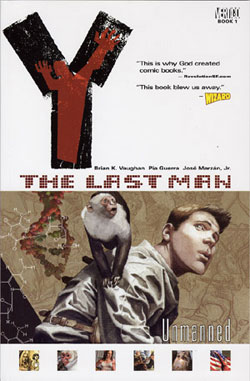 perspective,
perspective,
the way comic books are taller than they are wide, you’re seeing it in
a new way that I think gives you a safe amount of distance from it.
I think for a movie – I was talking to some friends in New York who were describing what it’s like to see the trailer for United 93
and the emotion in the audience – I because that’s how so many of us
experienced the day, seeing the images on our televisions, I think
televisions and movies have more of a burden. Seeing that live,
photographic image is how so many people experienced it, so they have
more of an obligation to handle it – I don’t want to say in an
appropriate way – but to do right by the moment.
Q:
I get concerned that we live in a society where people don’t want their
entertaining art to address actual feelings and issues.
Vaughan: There’s definitely an aspect of that. I understand that – as many people liked how audacious the first issue of Ex Machina
was, I think there were just as many who were really turned off by it.
I understand that. There are a lot of people who hate their jobs and
have a hard day to day existence, and if they have a few minutes to
enjoy something, they do want to escape. I can’t blame them for that.
And there are other people who want art that helps them engage the real
world, and I guess that’s always the art that turns me on the most.
Q: And that seems to be the art you’re doing.
Vaughan: Well,
it’s hard to say that about Runaways, with talking dinosaurs or
whatever. But I think it’s always a balance; even in a book like Runaways
I want to say something about authority and our relationships with our
parents. But again, that’s never the starting point. Whether I’m doing Ultimate X-men Annual or an issue of Ex Machina is it a good story is always my primary concern.
Q: It’s funny because I think Runaways and to an extent Young Avengers
are the Marvel books now that are truest to what Stan Lee was doing at
the beginning. Not just because they have younger characters but also
in terms of using this fantasy to address the reality of the lives of
the readers.
Vaughan:
That’s high praise – Stan Lee is certainly my biggest influence. Bendis
always talks about how amazing it is that something like Spider-Man has
endured for decades when you think about the shelf life of something
like Mighty Morphin Power Rangers or
Pokemon, how people eat up pop culture and dispose of it immediately. I
think that Stan Lee’s stuff is so enduring because it’s not just a fun
story – Spider-Man is great power with great responsibility, Daredevil
is justice is blind, Hulk is the monster in the man, they all have
these potent, simple, timeless ideas at the heart of them. When I was
coming up with Runaways I wanted to do – it’s impossible to do anything as well as Stan Lee did it – but I’m aiming for it.